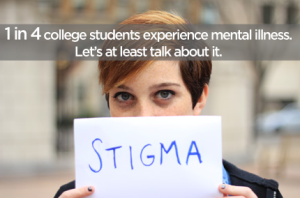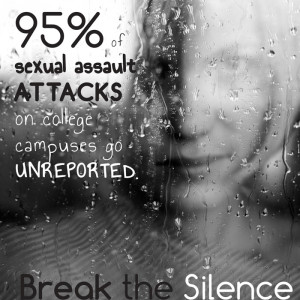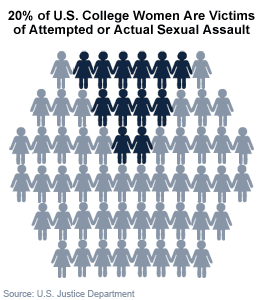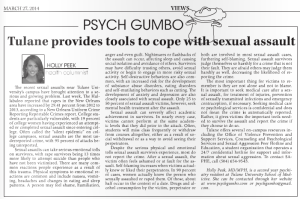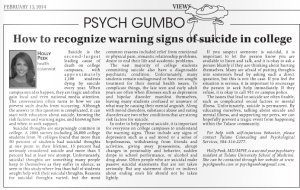Posts tagged ‘stigma’
Understanding Borderline Personality Disorder
The diagnosis of “borderline personality disorder” unfortunately carries with it much stigma. A “personality disorder” may carry negative connotations and the term “borderline” can conjure an image of an unstable person precariously straddling an imaginary line of what would be considered a “normal,” stable personality. BPD is a mental health issue just like anxiety and depression, yet it does not receive the same level of recognition.
Eight to 10 percent of those with the disorder commit suicide, which is a rate 50 times higher than in the general population. More than 70 percent of individuals with BPD will attempt suicide at least once, with rates peaking in individuals in their 20s and 30s.
Because of the dangerous consequences of BPD, it is important to increase understanding and encourage those with symptoms to seek therapeutic help, particularly in the vulnerable young adult population.
See how to recognize symptoms in my article appearing in The Hullabaloo.
More Information:
Colleges in Crisis: let’s talk about young adult mental health
The Tulane community has suffered several tragedies during the Fall 2014 semester, highlighting the need for awareness and advocacy for mental health issues on campus. Tulane isn’t alone in this mental health crisis. Colleges across the country struggle to meet the needs of their students and reduce the stigma surrounding mental illness. In order for us to come together as a community, we must talk about the unique mental health challenges college students face. Students must feel empowered to discuss mental health issues, while supporting and encouraging their peers to seek help when they need it.
See my article in The Hullabaloo to learn more about college mental health.
More Resources for College Mental Health:
Social Media and Mental Health
I’ve recently had several opportunities to share my interest in social media when it comes to public mental health, patient education, and advocacy. I’ve started writing as the Digital Media in Psychiatry Columnist for Psychiatric Times, working as the Media Editor for American Journal of Psychiatry Residents’ Journal, and had the amazing opportunity to be interviewed for Get Social Health, a new podcast about healthcare and social media.
If you’re interested in social media and mental health advocacy, check out some of my resources below! Would also love to hear what you think about mental health and social media, comments welcome!
Social Media: An Opportunity for Psychiatrists, Psychiatric Times, July 9, 2014
Psychiatry and Professionalism in the Digital Age, Psychiatric Times, June 19, 2014
Get Social Health Podcast, June 15, 2014
Sexual Assaults: The Silent Epidemic on College Campus
College students are particularly vulnerable to sexual assaults, with 19 percent of college women having experienced an attempted or completed sexual assault since entering college. Often called the “silent epidemic” on college campuses, sexual assaults are the most underreported crime, with 95 percent of attacks being unreported. These type of assaults take serious emotional tolls, with rape survivors being 13 times more likely to attempt suicide than people who have not been victimized. To learn more about the emotional tolls of sexual assaults and resources Tulane offers for survivors, check out my latest article in The Tulane Hullabaloo.
How to recognize warning signs of suicide in college
Suicide is the second-largest leading cause of death on college campuses, with approximately 1,100 students dying by suicide every year. Click my latest column below to learn more about suicide in college students, the risk factors and warning signs, and knowing how and when to seek support. Although the answer to preventing these tragedies is complicated, it can certainly start with educating ourselves about this tragic mental health issue.
Demystifying Therapy
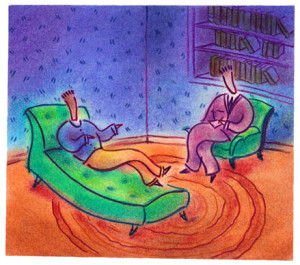
Therapy can benefit many people but is too often avoided. Some think they will be labeled as “crazy” by simply going to a therapist while others don’t understand exactly what goes on in the therapy room.
On this edition of Psych Gumbo, we will demystify the therapy session by discussing popular forms of therapy, who can benefit from therapy and how to shop for a good therapist.
Today’s special guest is Dr. Arjune Rama. Dr. Rama is a third year psychiatry resident at Yale School of Medicine. He also writes regularly about psychiatry in print and online. His work has been published in The New York Times “Motherlode” blog, Slate.com, and The New Haven Register among others. In addition to his clinical work he also teaches interviewing and writing skills to medical students in Yale’s psychiatry clerkship.
Self-injury is common and treatable in college
As a psychiatry resident working in New Orleans, I have the opportunity to treat a wide range of interesting people. I also have the great opportunity to work with college students when they show up to the Tulane emergency room in crisis. Something that I often see in these students and other young adults is a pattern of self-injury.
What may seem strange or scary to some, is a daily impulse for others. Check out my latest column in The Hullabaloo: 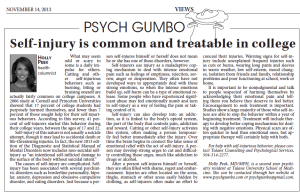
Why is mental illness scary?
Vampires, werewolves, witches and….the mentally ill? Halloween is a time we face our fears and make light of them by enjoying decorations, costume parties and horror movies. How has mental illness been lumped with the scary and supernatural themes of Halloween? Check out this blog post from Psychology Today that I helped co-write with Broadcast Thought!
http://www.psychologytoday.com/blog/broadcast-thought/201310/why-is-mental-illness-scary
LGBTQ Mental Health: Facing the Double Stigma
The LGBTQ community is a population that is faced with stigma and stereotypes. Because of this, those in this minority population are often more susceptible to mental health issues and are at higher risk for suicide. In fact, LGBTQ adults are 2.5x more likely than heterosexuals to have had a mental health disorder related to mood, anxiety or substance abuse, in their lifetime. Furthermore, the rates of suicide attempt among LGBTQ youth are 20-40% higher than among non-LGBTQ youth.
In this week’s Psych Gumbo, Dr. Holly Peek discusses mental health issues of the LGBTQ community with special guest, Dr. Myo Thwin Myint. Dr. Myint is a physician with training in pediatrics, general psychiatry and child & adolescent psychiatry. Among others, his interests includes LGBTQ mental health.
Here are some recommended resources for more information on LGBTQ mental health:
Meet the docs of Broadcast Thought: “Accuracy in Entertainment and Entertainment in Accuracy”
The doctors of Broadcast Thought provide expert consultation to the media and entertainment industries. Not only are they psychiatrists specializing in forensic, child adolescent, and adult psychiatry, they are also big fans of television, film, comic books, and pop culture. Self proclaimed “big kids,” they use their interests in pop culture to help educate the public about mental illness and decrease stigma by acting as creative consultants, subject matter experts, and co-producers of mental health content in pop culture.
Dr. Holly Peek will be discussing the portrayal of mental health in the media and entertainment industry. She will be interviewing two expert psychiatrists in this field, Dr. Vasilis Pozios and Dr. Praveen Kambam, who specialize in ensuring the portrayal of mental health is both accurate and interesting. These doctors are also just back from presenting at Comic Con in San Diego and are ready to talk about it!

